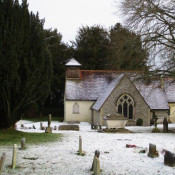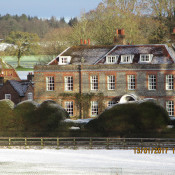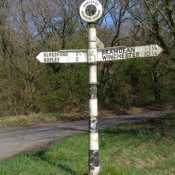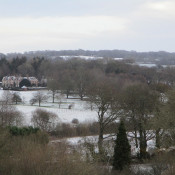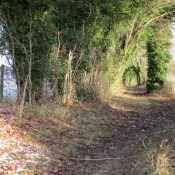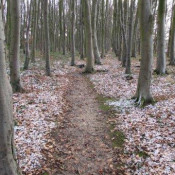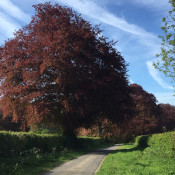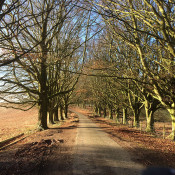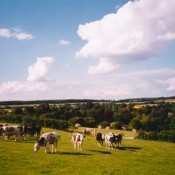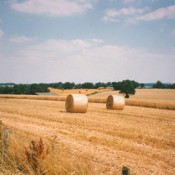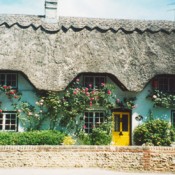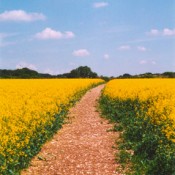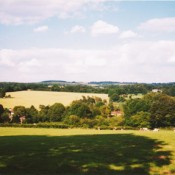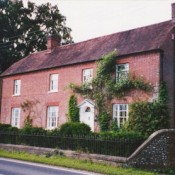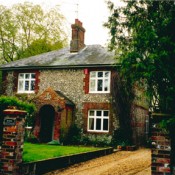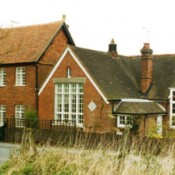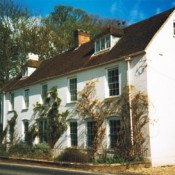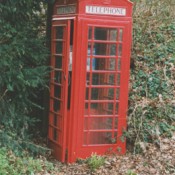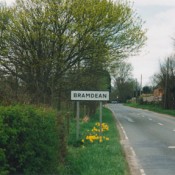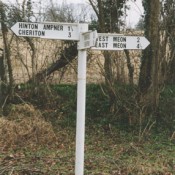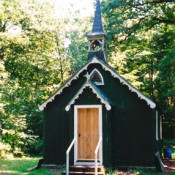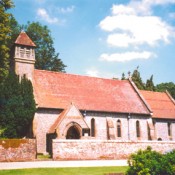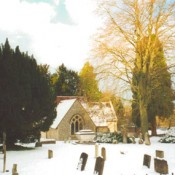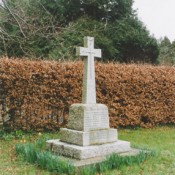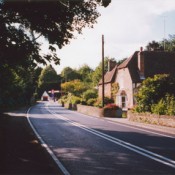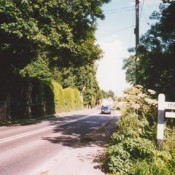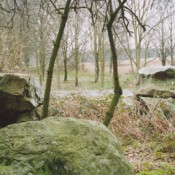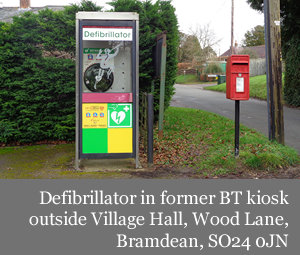A Bramdean Childhood
By Peter Tahourdin
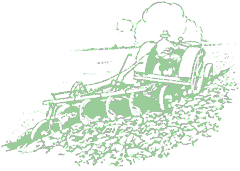 Peter Tahourdin is a composer, lecturer and broadcaster who now lives in Australia
Peter Tahourdin is a composer, lecturer and broadcaster who now lives in Australia
I was born in the Old Rectory house in Bramdean on the 27th August 1928, and apart from boarding school and a period of National Service in the army following the Second World War, I remained there until I went to study music in London in 1949.
My father, Major Victor Tahourdin, was a regular soldier, serving with the 22nd Cheshire Regiment. He was taken prisoner during the First World War and retired from the army soon after his release. He married my mother in the early ‘twenties and they moved to Bramdean before my sister, Elizabeth, was born there in 1925.
My memories of my childhood are happy ones. Bramdean, in those days, was a close knit community, containing a number of large houses and supporting a broadly convivial and active village life. Inevitably, there were some disagreements amongst the residents, but the feuds that resulted from them only rarely empted into serious conflict. For many years my father was the local representative on the Rural District Council and I remember clearly his inevitable reply, in response to my mother’s questioning when he returned home to lunch after a council meeting in Winchester, ‘Oh argy-bargy, argy-bargy.’ My mother, too, was for a number of years the president of the local branch of the Women’s Institute. In that capacity she organized regular functions in Bramdean and from time to time conducted expeditions of local women to such faraway places as Winchester and Southampton, and even, on rare occasions to London.
Every second Sunday, along with many others we attended matins at Bramdean Church where we had our own reserved pew. My father was a church warden and a member of the Parish Council. Our attendance at church was limited to every second Sunday because the services alternated between the churches of Bramdean and Hinton Ampner, conducted by the then Vicar, Canon Milner. Nonetheless, the church provided a focus for the life of the village, from which many, non-religious, activities sprang – including those of the Women’s Institute.
Life in Bramdean in the ‘thirties was very different to that of the ‘forties. Before the war, like others who lived in the larger houses, we employed servants – two live-in maids (a parlour maid and a house maid), a nanny, a cook who came in every day, and a gardener who lived with his family in a cottage in the grounds. With the advent of the Second World War all of that changed. The able-bodied med were called up for military service and the younger women either joined the armed forces, worked in munitions factories or joined the Land Army. My father, as an ex-army officer, became the commander of the LDV, later known as the Home Guard (Dad’s Army). I remember clearly the Battle of Britain in the early ‘forties. Many German ‘planes were shot down in dog-fights over the nearby countryside, on their way to or from bombing raids on Portsmouth. Sometimes, during school holidays, my close friend, Tim Heymann, and I would ride our bicycles along the secluded roads near the village and would come across the wreckage of German planes and occasional gruesome sights, such as a severed arm or leg, still wrapped in its military uniform, hanging from the branch of a tree or lying on the ground near the ‘plane. On one occasion I remember my father, standing in the hall of our house, attempting to question a German airman who had been shot down and brought to the house by the Home Guard. My father asked the man to sit down, but he refused to do so, saying he was too dirty. Later, the airman was collected by the regular army and taken away for interrogation.
During the war our house became a refuge for friends, in particular the family of an old friend of my mother, Pamela Johnston. They had lived in Titchfield – too close to Portsmouth for comfort – and Captain Johnston, an ex-navy man, had been posted to an administrative job in Scotland. Similarly, my friend Tim’s father, ex-army, had a wartime job in Surrey. They had lived at The Gomms opposite the village pub, and Tim stayed with us in the holidays. Sometimes, in the summer, he and I worked on Tony Dowling’s farm, alongside some of the inmates from the nearby lunatic asylum! By then our pre-war family of four had grown to a small community of nine or ten depending on the time of year. After the war life in Bramdean was changed forever.
While men and women came back to the village from their wartime activities, few returned to their former jobs as domestic servants. Those of us in the larger houses had learnt to fend for ourselves, but, apart from that, social mores had changed – as indeed they have done since, though in different ways.
My father died in the Old Rectory house in 1948 at the age of sixty-seven. My mother stayed on for a year, but since my sister and I had grown up and left home, she moved to Hove in Sussex, where she had several good friends. She died in 1977. Our house in Bramdean was sold to Brigadier Williams and his family Canon Milner had retired and his place as vicar had been taken by the Rev. Francis Barker.
I have many fond memories of my childhood in Bramdean. I remember the Post Office as a focus of village life and, since it was also the local telephone exchange, a source of endless gossip. I remember bicycle rides with Tim to Alresford during the war to collect provisions, even though the grocer, Mr Jolly, and the butcher still delivered by horse and cart. I remember the ring of the bell of the Walls icecream man on his regular trips through the village on his bicycle-driven sales van. I remember the game my father shot in surrounding fields and woodlands and which we ate with relish after it had been hung in the larder for a week – pheasant, partridge, hare – supplemented during the war by rabbits and the chickens we raised in the garden. I remember, too, the beauty of the countryside (and collecting field mushrooms for breakfast in the autumn), pre-war tennis parties with tea on the lawn afterwards, bridge and dinner parties – my mother and father, even when alone, always dressed for dinner. I remember the wartime radio programmes, such as ITMA, which we listened to round the fire on winter evenings, and being taught to drive by my father on rare trips by car to Winchester and Alresford – rare because of petrol rationing. I remember wartime meals – often improvised from leftovers, again because of rationing. But perhaps above all I remember the slower pace of life, so much less frantic than it is now.
I went to Australia with my wife and two daughters in 1964. Since then I have made several trips to England and have sometimes driven through Bramdean on my way to visit my old friend, Tim, who was for many years the manager of the West Dean Estate near Chichester, and have seen some of the changes that have taken place. The Fox Inn, for instance, is no longer the simple village pub it was when I was a child. The entrance gate to the Old Rectory house has been moved east to avoid some of the dangers of the heavier traffic along the Winchester to Petersfield road. On my last visit, in September 1997, I drove up to Bramdean Church and was pleased to find it little changed. I called in, too, at the Old Rectory house, where I was made charmingly welcome by the owners.
I have no regrets about my move to Australia and I have lived a rewarding and productive life there, working as a composer and as a lecturer at both the universities of Adelaide and Melbourne. Now that I have retired from my university life, I still remain active as a composer and still enjoy life in Australia If I do think of returning to live in England those thoughts are quickly banished when I remember the horrors of an English winter. Tim and I, as children, used to break ice many inches thick in the water butts outside the house. The very thought of it now makes me shiver. Oh, the chilblains!
Nonetheless, the many very pleasant memories of Bramdean remain strong and I am not sorry to have experienced life there as a child both before and during the Second World War.

